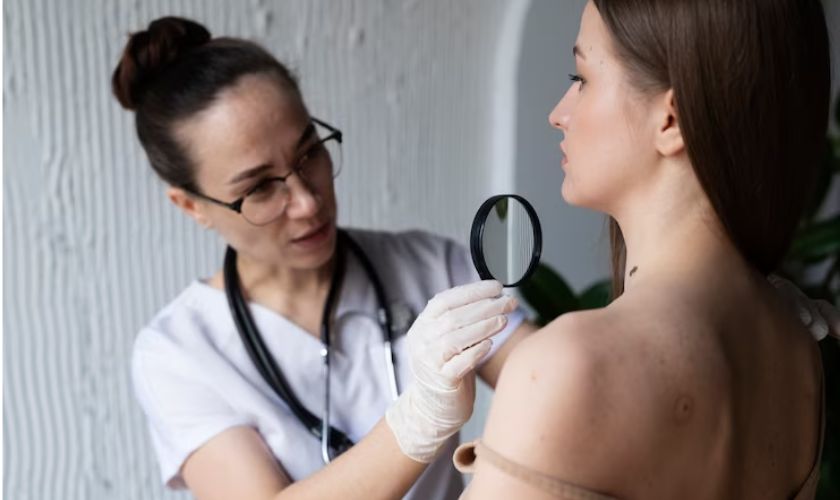Skin cancer follow-up care is a fundamental part of treatment and recovery. Dermatologists help monitor patients, manage recurring skin conditions, adjust treatments, and address side effects. These follow-up visits offer structured oversight to protect your overall health and prevent complications. Here are some of the specific roles dermatologists play in skin cancer follow-up care:
Detecting Recurring Cancer
A dermatologist’s expertise helps spot recurring skin cancer cases, often before symptoms appear. Regular check-ups help track changes in your skin closely. Using specialized tools, they examine moles, growths, or lesions under magnification to detect signs of cancer that might otherwise be missed.
During follow-up visits, your provider may compare your current skin condition to previous records. These exams and discussions help identify changes, even in areas that have been previously treated. Sometimes, they perform biopsies on suspicious spots to catch abnormal cells early and provide quick treatment.
Modifying Treatments
Skin cancer treatments often need to be adjusted depending on the current condition of the skin and any new developments. Dermatologists lead these adjustments, using precise techniques to address evolving challenges.
One method is Mohs surgery, a technique used to treat skin cancers while conserving healthy tissue. When necessary, dermatologists modify this procedure to target stubborn or recurrent cancers. By working in stages and examining tissues immediately, they can aim to remove cancerous cells completely.
Cryotherapy is another treatment that is used, especially for specific types of skin cancer. It involves applying extreme cold to destroy unwanted cells. Dermatologists decide which lesions respond to cryotherapy and make adjustments as needed.
Similarly, treatments like curettage and electrodesiccation may be recommended during follow-up visits. These procedures involve scraping away abnormal cells and using heat to reduce the risk of recurrence. Each visit helps your dermatologist determine whether this approach or another is most effective as you recover.
Managing Side Effects
Skin cancer treatments often result in physical changes that need ongoing management. Dermatologists assist patients through every phase of this process, offering targeted recommendations and medical advice to address specific side effects. Dermatologists evaluate the healing process and propose remedies to minimize discomfort or scarring.
This might involve topical treatments, scar methods, or additional skin procedures designed to promote skin recovery. Dermatologists monitor these changes, offering solutions tailored to sensitive, recovering skin. Here are some side effects dermatologists monitor:
- Persistent skin redness is treated with specialized creams.
- Swelling or inflammation is often alleviated through applications.
- Sensitivity is addressed using prescribed sunscreens or protective routines.
Dermatologists collaborate with patients to enhance cosmetic outcomes while also fostering a supportive environment.
Follow Up With a Dermatologist
Ongoing follow-up care plays a pivotal role in skin cancer treatment and long-term health. From detecting cancer early to adjusting treatment plans and managing side effects, dermatologists contribute a unique range of expertise that cannot be replaced by generalized care. If you’ve undergone skin cancer treatment, schedule your follow-up appointment with a dermatologist. Doing so supports your recovery and provides the necessary medical oversight to maintain your skin’s health after treatment. Connect with a dermatology clinic today to take the next step in your follow-up care.









